The Centre of Research Excellence ALIVE WELL aims to improve the quality of life for gynaecological cancer patients and survivors.
ALIVE WELL aims to move away from the outdated, rigid models currently offered as standard of care for gynaecological cancers, toward more contemporary, women-centred approaches. The three priority areas of research will focus on:
- Enabling fertility after endometrial cancer.
- Reducing lymphoedema incidence, a common side effect of cancer treatments.
- Enhancing recovery from cancer, allowing women to regain their health and function.
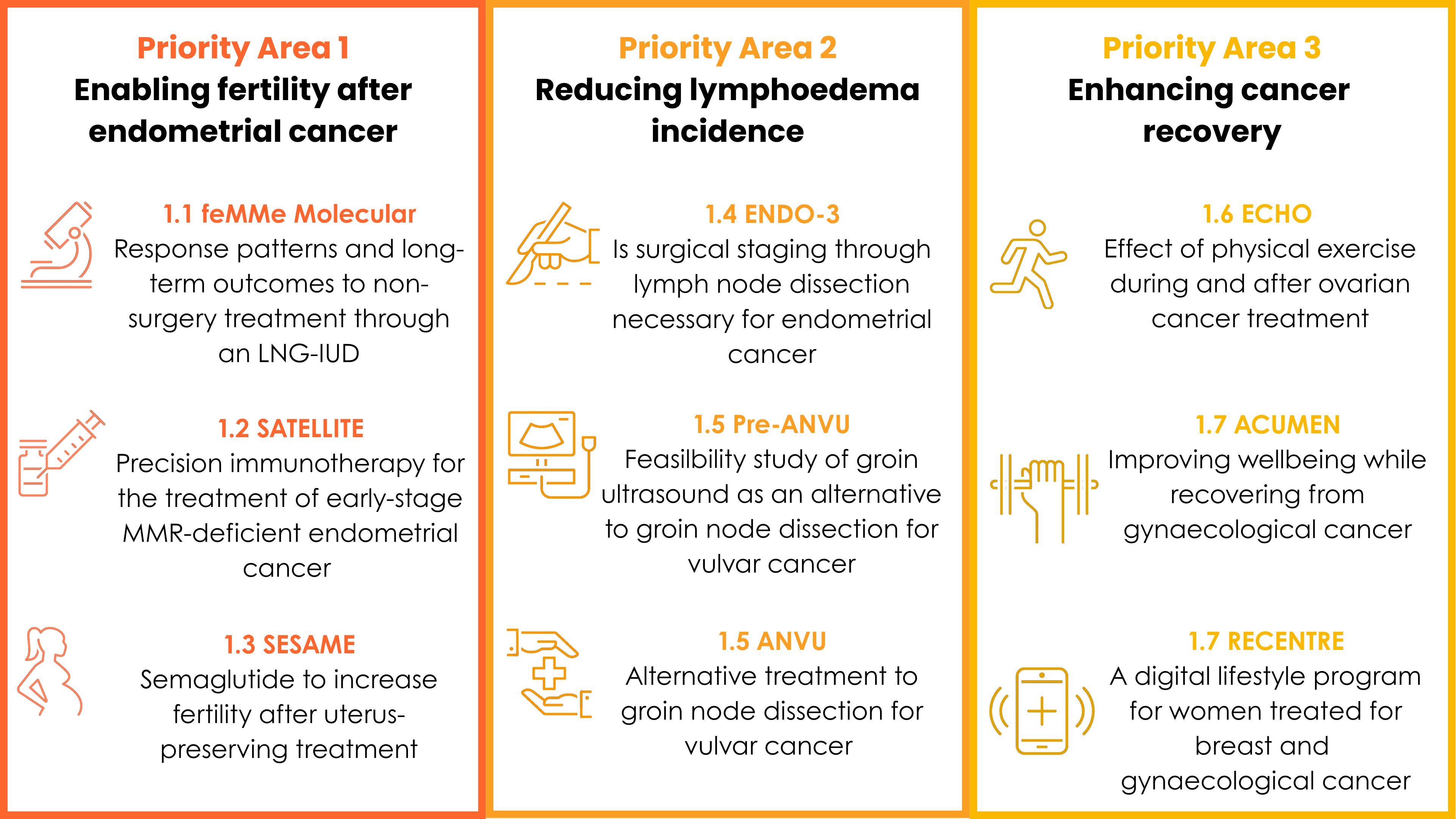
Building on six clinical trials already underway (feMMe, SATELLITE, ENDO-3, Pre-ANVU, ECHO, and ACUMEN), involving over 2,500 women worldwide, ALIVE WELL will launch three new trials (SESAME, ANVU and RECENTRE) to further explore the impact of personalised treatment. Ultimately we hope to see women not only surviving but living well after cancer.
feMMe
Endometrial cancer affects more than 3,000 women in Australia every year. Standard treatment is by hysterectomy. The feMMe clinical trial treated women with endometrial cancer less-invasively through the use of the Mirena, an intra-uterine device. The results revealed the fertility-sparing treatment is well tolerated and leads to complete pathologic response in up to 60% of women. Unfortunately, we cannot predict yet who will benefit from this treatment. If we can determine who will respond, clinicians could specifically offer this treatment to women who will likely benefit. The feMMe Molecular study will use blood and tissue samples collected as part of the feMMe trial, to identify predictive biomarkers of LNG-IUD response that indicate whether a patient will or will not benefit from this new treatment. Using the findings, we will develop a personalised decision tool that clinicians and patients can use to decide on the best treatment for them.
SATELLITE
The SATELLITE study focuses on evaluating the effectiveness and safety of Dostarlimab, a new immunotherapy treatment for patients with early-stage endometrial cancer. With its favourable pharmacokinetic and safety profile, dostarlimab provides a potential active and tolerable surgery-sparing strategy. This Phase 2b clinical trial will see 10 women participating in the treatment regimen for a 12 month period. If successful, this treatment could be approved for wider use, providing more women with a non-surgical alternative to treat early-stage endometrial cancer.
SESAME
The majority of women who successfully completed uterus-preserving treatment for endometrial cancer (feMMe trial) may not fall pregnant post-treatment due to underlying medical issues. Semaglutide is registered in Australia as an adjunct diabetes mellitus treatment and evidence suggests it is effective in the treatment of polycystic ovary syndrome. The Semaglutide study will provide 30 women an opportunity to receive the treatment over a 12 month period and follow them for a further 24 month period to determine feasibility and effectiveness.
ENDO-3
Clinical management guidelines for early-stage endometrial cancer prescribes surgical staging through a lymph node dissection (LND). To date, no randomised clinical trial has shown a patient benefit for LND versus no-LND. Lymphoedema is a burdensome and long-term side effect of LND as part of cancer treatment. ENDO-3 is a national and international Phase 3 randomised clinical trial which aims to determine if there is value to retaining the LND procedure. The results of this study will inform clinical practice management guidelines and influence health policy. We aim to enrol 760 patients, with the key outcome to improve the quality of life of women after surgical treatment of endometrial cancer.
Pre-ANVU & ANVU
Around 400 Australian women are diagnosed with vulvar cancer every year and an estimated 2,500 survivors are currently living with debilitating and long-term side effects following treatment. Standard treatment involves the removal of the groin lymph nodes, which puts patients at a high risk of lymphoedema. The ANVU trial aims to reduce the risk of debilitating morbidity from vulvar cancer treatment, without compromising survival. Driven by patient concerns about treatment and need for other options, Pre-ANVU was a feasibility pilot cohort study to determine the diagnostic accuracy of a non-invasive groin ultrasound in predicting the presence of cancer in the groin lymph nodes. ANVU will be a Phase 3 national and international clinical trial, recruiting 600 women to test the safety and effectiveness of using high-resolution ultrasound rather than groin lymph node dissection. The study will also assess patient health outcomes related to quality of life, with the aim to see women suffering from fewer treatment-related side effects.
ECHO
Ovarian cancer is the most common cause of gynaecological cancer death. Side effects from the disease and its associated treatments are common, contributing to dose reductions or delays in treatment, as well as leading to declines in quality of life, high morbidity and mortality. The ECHO trial is a Phase 3 Randomised Clinical Trial assessing whether exercise during chemotherapy can improve physical wellbeing, adherence to chemotherapy and treatment outcomes for 524 women with ovarian cancer. We will use the ECHO data to provide new insights into the mechanisms and mediators of exercise-induced effects on cancer biology and progression, and will produce the implementation evidence and tools required for equitable system change in ovarian cancer care.
ACUMEN
Exercise reduces the detrimental side effects of cancer treatments. However, most women recovering from gynaecological cancer have limited access to the support that would help them safely integrate exercise into their daily lives. We have recruited 245 women, with a randomised group completing a personalised exercise program over a 12 week period. The ACUMEN trial aims to improve women’s overall wellbeing and important aspects of health after treatment for gynaecological cancer, and to demonstrate the benefits of exercise as cost-effective ‘usual care’ after treatment.
RECENTRE
Almost 27,000 Australian women are diagnosed with breast and gynaecological cancer every year. Many survive into old age after successful treatment. But survival does not mean women automatically return to good health. The RECENTRE trial will see 800 women receiving whole of lifestyle intervention to improve quality of life and health following breast and gynaecological cancer treatment.
Chief Investigators
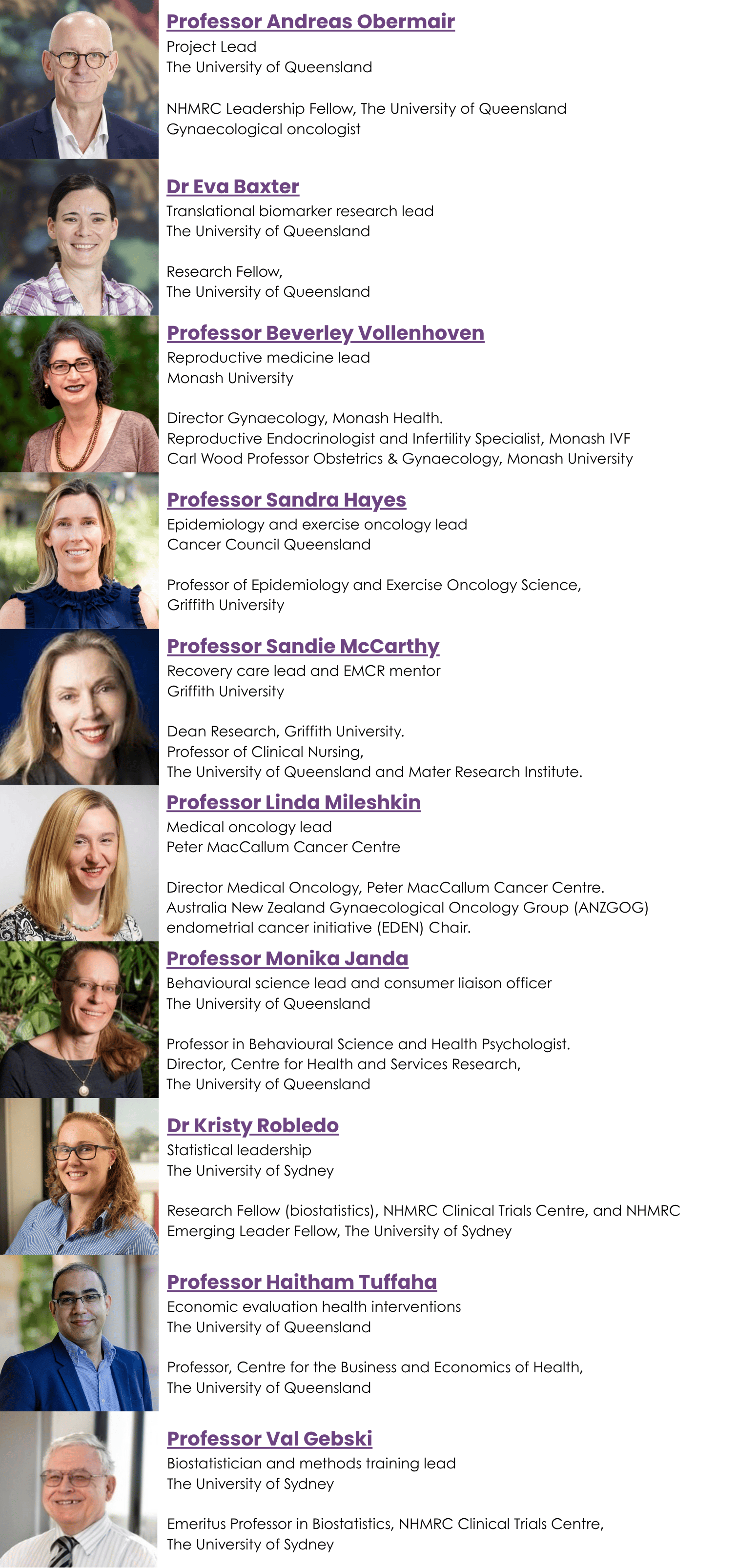
Associate Investigators
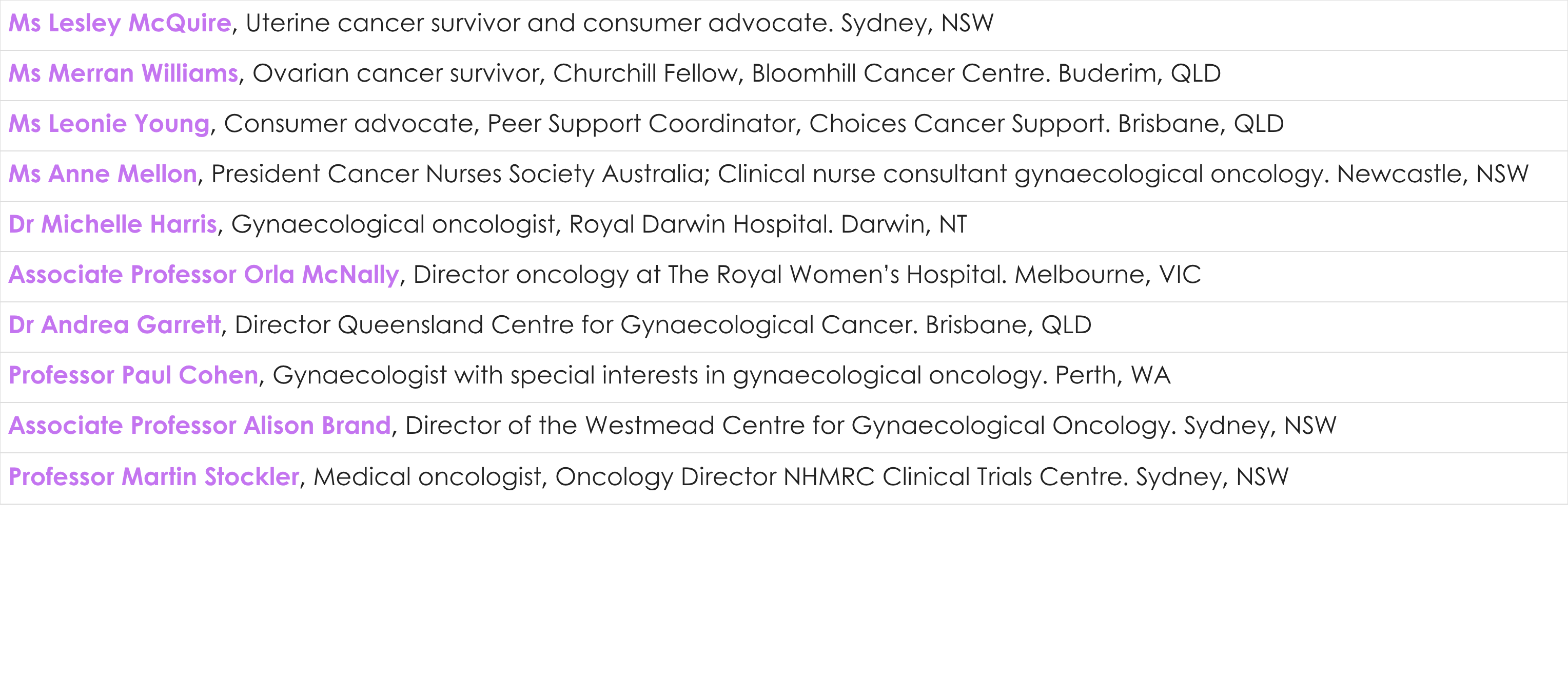
News
- ENDO-3 Clinical Trial reaches its halfway mark milestone in recruitment, with 380 of our 760 participants enrolled (January 2026)
- SATELITTE Clinical Trial recruits its first patient (November 2025)
Publications
Al Ramadhani, Ruqaiya et al. "Diet and lifestyle quality in Australian females with edometrial cancer at diagnosis: Insights from the fertility-sparing management for early endometrial cancer (FeMMe) trial." Nutritional Epidemiology and Public Health. vol. 9,12. Dec. 2025
Baxter, Eva et al. "Central Pathology Review of Endometrial Hyperplasia and Adenocarcinoma Before and After Treatment With the Levonorgestrel Intrauterine Device–Results From the feMMe Phase 2 Randomized Clinical Trial." The American Journal of Surgical Pathology. 10.1097/PAS.0000000000002492, Nov. 2025
Chiu, Vivian et al. “Enhancing treatment outcomes after gynaecological cancer (ACUMEN): a randomised controlled exercise trial protocol.” BMC cancer vol. 25,1 1195. Jul. 2025
DiSipio, Tracey et al. “Understanding Contemporary Endometrial Cancer Survivorship Issues: Umbrella Review and Healthcare Professional Survey.” Cancers vol. 17,16 2696. Aug. 2025,
Events
2025 Gynaecological Cancer Patient Symposium
An enlightening and supportive event designed to connect, reflect, and learn about the latest advancements in gynaecological cancer research. This symposium was an opportunity for patients, families, and their support teams to gain insights from leading experts and stay informed about ‘hot topics’ in the field.
Collaborators
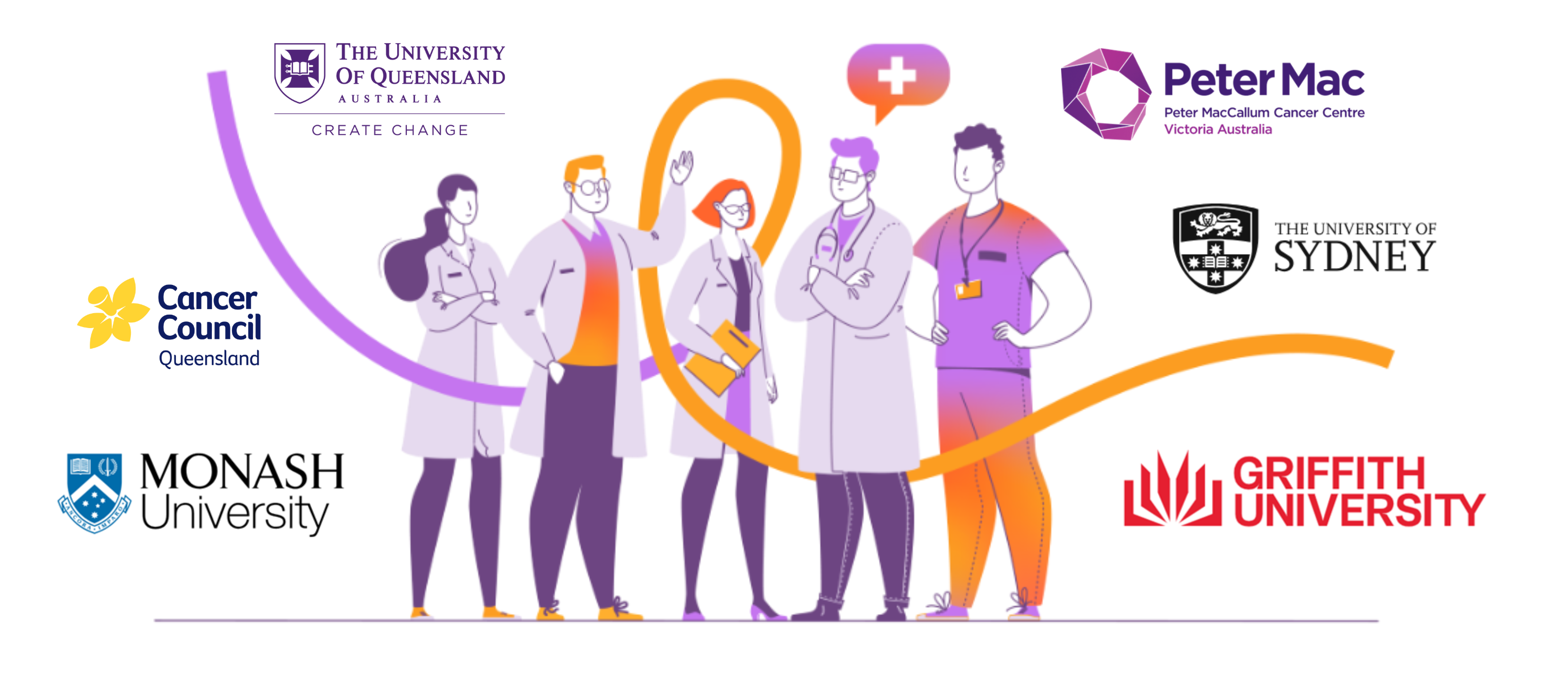
Community
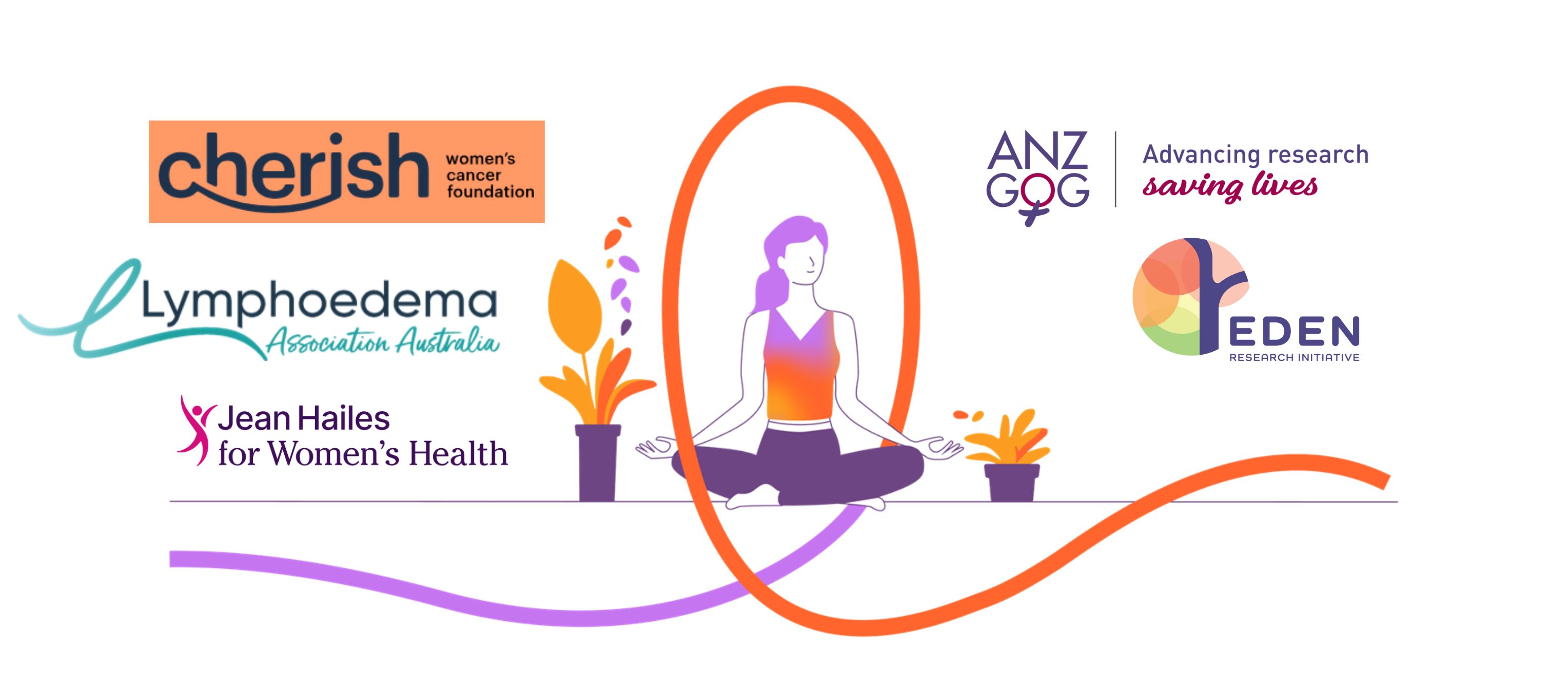
Contact us
Get in touch to learn more about our research.
Current PhD Scholarship opportunities
Dr Lauren Angel
Research Program Manager
(07) 3443 6352 cre-alivewell.centre@uq.edu.au
